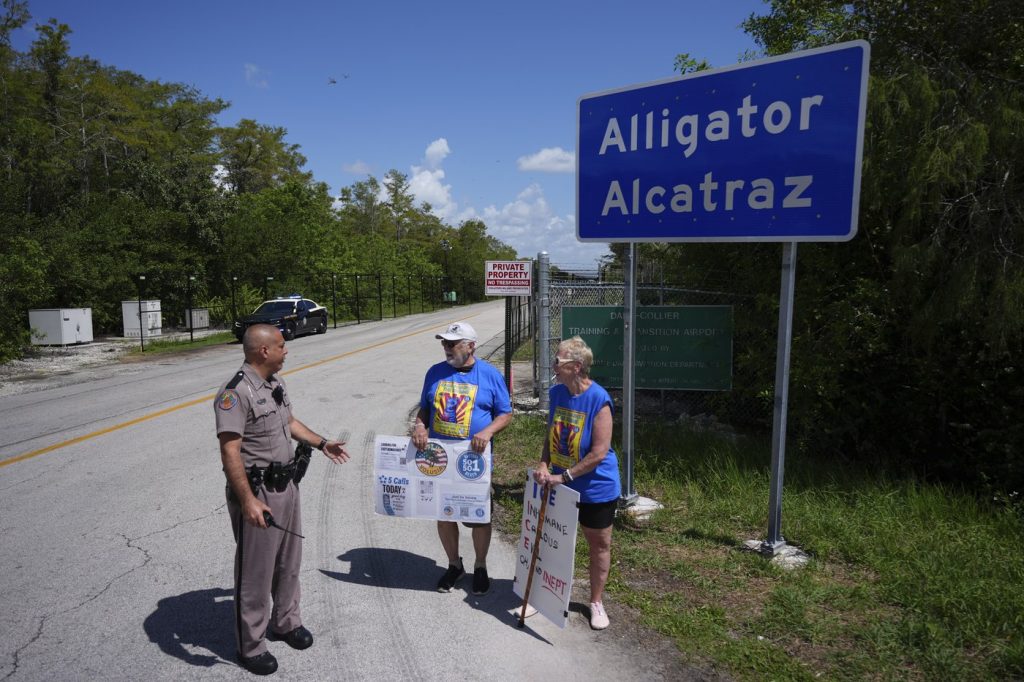ORLANDO, Fla. (AP) — Florida Governor Ron DeSantis is currently dealing with a complex funding dilemma regarding the controversial immigration detention center known as "Alligator Alcatraz," located in the Florida Everglades. Recently, an appellate court panel issued a temporary stay on a lower court ruling that ordered the governor's administration to cease operations at the facility, thereby prolonging the challenges surrounding its existence.
The appellate court's decision presents a predicamental choice: Florida can either forfeit federal reimbursement for the hundreds of millions invested in building and operating Alligator Alcatraz, or accept the funding and subsequently face a mandatory federal environmental review, which poses risks of halting the center's operations. The judges on the appellate panel determined that since Florida had yet to receive federal funding for the facility—a situation contrary to previous assurances—the project does not require an environmental impact study that is typically mandated for developments on sensitive wetlands.
The majority of the three-judge panel held that the lack of federal funding rendered the actions involving the detention center as "non-federal," hence exempt from the environmental review process. They emphasized that since no federal dollars have been allocated to the construction or operation of the facility, its activities, which are solely funded and operated by Florida, do not constitute a "major federal project."
Homeland Security Secretary Kristi Noem indicated this summer via social media that the facility would predominantly be funded through FEMA’s shelter and services program. If Florida opts to proceed with this federal funding, however, it may necessitate conducting an environmental analysis, according to the judges' ruling.
The appellate panel's decision effectively stays a preliminary injunction from U.S. District Judge Kathleen Williams, which mandated the detention facility to reduce its operations by late October while the legal case advanced through the courts. This stay remains in effect until further rulings are confirmed through the appeal process.
When questioned about whether the appellate ruling might influence their application for federal funding, the governor's office did not provide a direct response. Instead, press secretary Molly Best shared video clips of DeSantis discussing Alligator Alcatraz but refrained from addressing funding issues in those discussions.
In late June, DeSantis's administration raced to establish the detention facility on an isolated airstrip amid the Everglades, intending to support then-President Donald Trump's initiatives aimed at deporting undocumented immigrants. Trump has since visited the facility, asserting it could serve as a potential model for further immigration detention centers across the country, as his administration seeks to augment the necessary infrastructure to escalate deportations. Other states have likewise begun to announce plans for their detention facilities in alignment with these federal initiatives.
The environmental lawsuit against Alligator Alcatraz is one of three federal lawsuits challenging its operations in the Everglades. Recently, a second immigration detention center has also opened in north Florida, located in a decommissioned prison.
Contending that Florida taxpayers should not bear the financial burden for federal immigration services, Paul Schwiep, an attorney for Friends of the Everglades, remarked that Judge Williams had placed her trust in the administration's assertions regarding federal funding. He criticized the appellate panel for essentially implying that politicians' promises regarding funding could not be trusted.
Additionally, Elise Bennett, a senior attorney for the Center for Biological Diversity, interpreted the ruling as a potential advantage for the DeSantis administration and DHS, suggesting that they might exploit this situation to evade meaningful federal scrutiny. She expressed concerns that withholding reimbursement until project completion could lead to irreversible environmental damage, rendering any subsequent analysis ineffective.











